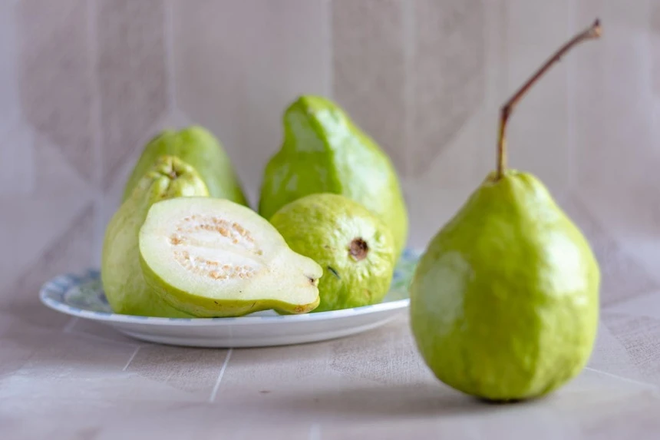
Doctors reveal that eating guava causes...
Guava is a nutritious fruit packed with vitamin C, fiber, and a variety of bioactive compounds. When eaten in normal amounts, it can support immunity, digestion, heart health, and even blood-sugar balance.
But like many healthy foods, too much guava — or eating it with certain medical conditions — can also lead to digestive discomfort, allergies, or blood-sugar interactions.
Here’s a clear breakdown of the benefits and the possible side effects, plus practical tips for safe daily use.
⭐ What Guava Helps With
1. Strong Immune Support — thanks to extremely high vitamin C
Guava is one of the richest natural sources of vitamin C, often providing more than 100% of the daily recommended value in a single fruit.
Vitamin C strengthens white blood cells, protects tissues from oxidative stress, and supports overall immune defenses. Regular intake helps your body respond more effectively to infections and inflammation.
2. Improved Digestion & Better Bowel Regularity — because of soluble + insoluble fiber
Guava contains both types of fiber:
-
Insoluble fiber adds bulk to stool and speeds up intestinal movement
-
Soluble fiber (like pectin) forms a gel that helps stabilize digestion
Together, they support smoother bowel movements, reduce constipation, and promote a healthier gut environment. Many people notice improved regularity after eating guava consistently.
3. Lower Post-Meal Blood Sugar — due to pectin + guava leaf compounds
The pectin in guava slows the absorption of glucose in the gut. This helps prevent sharp spikes in blood sugar after meals.
Guava leaf extracts, rich in flavonoids and other bioactives, have been shown in some studies to:
-
Improve insulin sensitivity
-
Lower post-meal glucose levels
-
Support metabolic health
Important: These effects are supportive, not a replacement for prescribed diabetes medications.
4. Heart-Health Benefits — from fiber, potassium, and antioxidants
Guava supports cardiovascular health in several ways:
-
Its fiber can help reduce LDL (“bad”) cholesterol
-
Its potassium helps regulate blood pressure and maintain normal heart rhythm
-
Its antioxidants reduce oxidative damage to arteries
Together, these nutrients may help lower the risk of heart disease when guava is part of a balanced diet.
5. Anti-Inflammatory & Antimicrobial Effects — due to plant phytochemicals
Guava leaves and peel contain compounds such as:
-
Polyphenols
-
Flavonoids
-
Tannins
These have documented anti-inflammatory, antimicrobial, and even mild pain-relieving effects in laboratory studies. This is why guava leaves have been used traditionally for diarrhea, gum problems, and wound care.
⚠️ What Guava Can Cause
1. Bloating, Gas, or Diarrhea — especially when eaten in excess
Guava contains natural sugars (including fructose) and a significant amount of fiber. If you eat too much:
-
Fructose can ferment in the gut
-
Fiber can overload the digestive system
-
Seeds may irritate sensitive stomachs
People with IBS or fructose malabsorption are more likely to experience gas, bloating, or loose stools.
2. Constipation — if you eat a lot without enough water
Although guava usually helps with constipation, very high fiber intake without enough hydration can actually harden stool and slow digestion.
The key is balance: fiber + water.
3. Allergic Reactions or Oral Allergy Syndrome
Some people experience reactions because certain guava proteins can cross-react with pollen allergens. Symptoms may include:
-
Itchy lips or mouth
-
Mild swelling
-
Hives
-
In severe cases: nausea, vomiting, or throat irritation
Anyone with a history of fruit or pollen allergies should be cautious.
4. Risk of Low Blood Sugar — if combined with diabetes medications
Because guava (especially leaf extracts) can help lower blood glucose, combining it with:
-
Insulin
-
Sulfonylureas
-
Other glucose-lowering medications
may increase the risk of hypoglycemia.
People with diabetes should monitor glucose closely and consult a clinician when adjusting their diet.
5. Skin or Contact Irritation (rare)
Direct contact with guava leaves or peel may irritate sensitive skin, especially when using homemade remedies. This is uncommon when simply eating the fruit.
✔️ Practical Guidance
Moderation
For most healthy adults, 1 medium guava per day is safe and beneficial.
If you have diabetes
-
Monitor blood glucose
-
Tell your doctor if you start drinking guava-leaf tea or eating guava regularly
Your medication dose may need adjustment.
If you have IBS or a sensitive gut
Start with half a fruit and see how your body responds.
If you have allergies
Stop eating guava if you notice mouth itching or swelling and consult an allergist.
If using guava extracts/supplements
These are more concentrated than the fruit — use cautiously and seek medical advice first.

Quick Takeaways
The Good
-
Boosts immunity (vitamin C)
-
Supports digestion (fiber)
-
Helps control blood sugar (pectin, leaf compounds)
-
Improves heart health (potassium, antioxidants)
The Cautions
-
Too much may cause bloating or diarrhea
-
Can trigger allergies
-
May interact with diabetes medications
-
High fiber intake requires enough water
News in the same category


Just Minced Meat, But Made This Way, It Becomes Irresistibly Delicious

Top 10 Occupations with the Highest Risk of Cancer

Women Who Drink Perilla Leaf Water with Lemon at These 3 Times: Brighter Skin and a Slim Waist

Why Is the Left Burner of a Gas Stove Not Ideal for Cooking?

Is It Dangerous to Stay Inside a Car During a Lightning Storm?

Tips to Distinguish Naturally Ripened Bananas from Chemically Ripened Ones

My Nana’s 2-Minute Trick to Get Rid of Puffy Eyes (No Work Needed!)

JUST MAKE THE RACK THIS WAY

The shower head is easily clogged after long use. This way, the dirt will drain away by itself and replace it with a new one

Boiling shrimp with a handful of these leaves makes the shrimp bright red, sweet meat, everyone praises it.

New Towels Feeling Sticky and Smelly? Soak Them in This to Make Them Clean

🧼 Here’s My Easy Way to Clean Oven Racks: Just One Bag & a Natural Soak

🍌 5 High-Fiber Foods That Naturally Support Digestion & Relieve Constipation

Crush a handful of these leaves and place them in the room.

Soaking vegetables in salt water is not as good as you think, if you want them clean, do it this way

Netizens compete to show off their secret tips for cleaning carved wooden tables and chairs to welcome Tet

Don't burn peach trees anymore: This is the way to help peach blossoms bloom, sprout, and still be brilliant after Tet

Add a drop of essential oil to an onion and no matter how many mosquitoes and insects it has, they will disappear
News Post

Many People Still Don’t Know The Meaning Behind Shoes Strung Up On A Power Line

Arnold Schwarzenegger’s Son Continues His Impressive Weight-Loss Journey

‘Get Out!’: Black Woman Banned from Restaurant After Refusing to Tip Waitress with ‘a Disgusting Attitude,’ But She Doesn’t Back Down, Video Shows

Stephen Hawking Predicts the End of the World Is Nearer Than We Think

Caroline Flack’s ex Lewis Burton says he’s received ‘online abuse’ in rare statement over Disney documentary

The Viral 70LB Baby That Was Featured On Jerry Springer Is All Grown Up, And You Better Sit Down Before Seeing Him Today

The Viral 70LB Baby That Was Featured On Jerry Springer Is All Grown Up, And You Better Sit Down Before Seeing Him Today

‘Wanna be from the Trenches So Bad’: Tiny Harris Claps Back After T.I. Embarrasses Son King at Their Grandchild’s First Party

3 Deadly Mistakes People Make with Water Heaters – Don’t Risk Your Life

The surprising vitamin that helps break down leg clots—are you getting enough?

Just Minced Meat, But Made This Way, It Becomes Irresistibly Delicious

Prince William steps out with King Charles for special Windsor Castle reception to mark Remembrance Day

Top 10 Occupations with the Highest Risk of Cancer

Women Who Drink Perilla Leaf Water with Lemon at These 3 Times: Brighter Skin and a Slim Waist

Why Is the Left Burner of a Gas Stove Not Ideal for Cooking?

Kelly Brook ‘horrified’ as GP offers her weight-loss jabs ahead of I’m A Celebrity stint: ‘I love my curves!’

Is It Dangerous to Stay Inside a Car During a Lightning Storm?

Tips to Distinguish Naturally Ripened Bananas from Chemically Ripened Ones

Meghan Markle shares video of Prince Harry in Afghanistan in Veterans Day message
